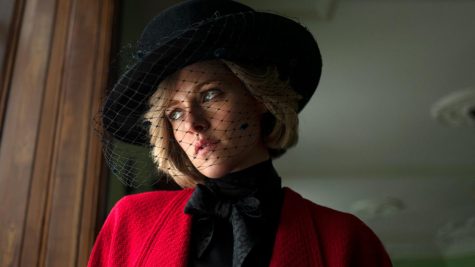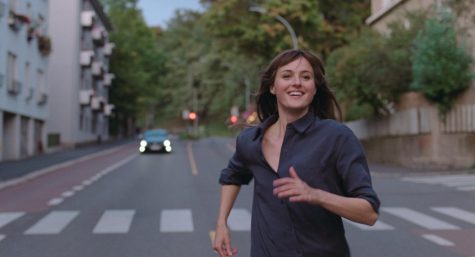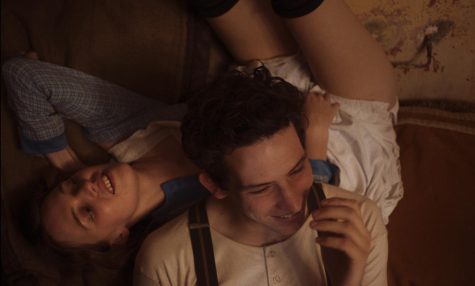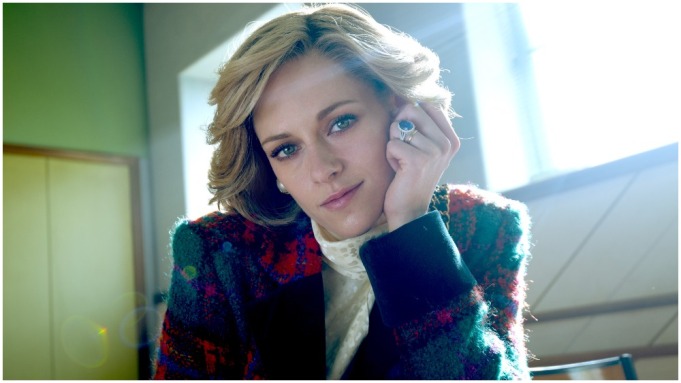‘Spencer,’ ‘Tsugua Diaries’ highlight second week of Chicago Film Festival
Kristen Stewart stars as Princess Diana in “Spencer,” which was shown at the Chicago International Film Festival Oct. 20 and Oct. 22. The film comes out in the U.S. Nov. 5.
After a week of highly-anticipated premieres, the Chicago International Film Festival returned with a lineup of films just as big and exciting as those from week one. With big name premieres like “Spencer,” featuring Kristen Stewart as Princess Diana, Kenneth Branagh’s “Belfast” and a closing night celebration Sunday, the second week of the festival proved to be a success. Here’s buzz’s recap of week two of the Chicago International Film Festival.
“Spencer”
What a gift the experience of seeing Pablo Larraín’s “Spencer” on the big screen is. Not only is the film an incredibly raw, heartbreaking yet beautiful snapshot into one of many complicated weekends of Princess Diana (Kristen Stewart), but it’s also a unique movie-viewing experience that moviegoers are lucky to be able to have in their lifetime.
The film had both a press screening and general festival screening last week at the festival. It takes place during the Christmas holiday at the gloomy Sandringham House in 1991, 10 years after the marriage of Diana and Prince Charles. Though “Spencer” is a biographical film, Larraín includes psychological twists that invites the audience into the mental state of Diana during her holiday trip, which ends up being more of a holiday nightmare. The dreary atmosphere, created both by the royal family’s coldness toward Diana and the literal coldness of the December weather in Sandringham, seems to make its way into the audience, too. It’s hard not to put yourself in Diana’s shoes and feel the loneliness and sadness that penetrated her life.
“Spencer” would not be a success without the stunning performance of Stewart, whose selection for the role of Diana created shock and skepticism among many loyal watchers of the most recent season of “The Crown” and avid Diana fans, who can be very protective over who’s chosen to play the people’s princess. As one of those fans, I can assure other fans that Stewart fully and naturally embraces Diana, not only playing her well but completely transforming into her. Any semblance of of Stewart disappears, and you almost feel like you’re right there with Diana, experiencing everything with her. Her performance pierces your heart in the best and worst ways, just as the reality of Diana’s life and death did and does.
Get The Daily Illini in your inbox!
“Spencer” comes out in the U.S. Nov. 5.

“The Tsugua Diaries”
“The Tsugua Diaries,” directed by Maureen Fazendeiro and Miguel Gomes, was filmed in lockdown and released on July 13. The title is a tease at the narrative structure of the film, as “Tsugua” is August spelled backward. The film is considered a pandemic project that speaks to the creative outlets sought after in the time of desperation brought on by quarantine.
Beginning at day 22, the film centers around three friends deciding to fill their time in the summer by building a butterfly garden. The story is a countdown from the first day, subsequently reaching day one at the end. As it progresses, it’s revealed that the friends are cast members of a film being filmed during the COVID-19 pandemic. Due to the order in which the plot is presented, characters appear and settings expand, introducing a completely different world than what it began with.
Shot in 16mm, the film has captivating visuals complete with long takes, a setting filled with diverse nature and vibrant-colored lighting. The primary conflict is relevant to many as it focuses on the difficulties of achieving successful teamwork during a pandemic. Because of the reverse order, the film requires a lot of attention and recall abilities in order for the plot to flow smoothly. The backward narrative of “The Tsugua Diaries” introduces an unconventional storytelling structure that unfolds itself in a captivating way.

“The Worst Person in the World”
Joachim Trier’s “The Worst Person in the World,” Norwegian’s Best International Feature Film entry for the 94th Academy Awards, premiered at the Chicago Film Festival on Saturday, Oct. 16. The film had a successful run at the Cannes Film Festival with Renate Reinseve winning Best Actress for her performance as Julie, a former medical student who changes her collegiate path to study psychology.
The story follows a conflicted and complicated Julie in 12 chapters, including a prologue and epilogue. The prologue establishes her relationship with Askel, an illustrator who is 15 years older than her. While they are together, Julie must confront her feelings toward having children and what it means to be a family. She later develops feelings for another man and faces a decision regarding her two partners. Throughout the chapters, Julie grapples with understanding her identity, passions and relationships as she navigates the final years of young adult life.
The charming and heartbreaking film is refreshing and relatable with an even more engaging, original protagonist. Reinseve’s performance is immersive and magnetic as she brings Julie to life on screen; her acting style is simple in its delivery yet builds to create such a sophisticated, complex woman. The primarily realistic film has scenes incorporating elements of expressionism, keeping it fresh and unique throughout its run time. “The Worst Person in the World” beautifully explores the fear that comes with feeling lost in a sea of other identities.

“Mothering Sunday”
Eva Husson brings a story of forbidden love to the big screen with “Mothering Sunday,” a period drama starring Odessa Young, Josh O’Connor, Olivia Colman and Colin Firth. The story, based on the novel by Graham Swift, follows Jane Fairchild (Young), a housekeeper, and her affair with the wealthy neighbor Paul (O’Connor). It’s Mother’s Day, and Jane spends her day off with Paul, who later has to head out to a Mother’s Day lunch to celebrate his engagement to someone else.
Though the film’s plot is compelling at first (how can the story of the the maid having an affair with the engaged neighbor not be?), the film’s spark fades as we fall in and out of time shifts into Jane’s future. It ends up distracting the audience from the relationship between Jane and Paul, which could have been stronger if we saw more interactions between the two and if we weren’t taken away from them by these time jumps.
Young and O’Connor keep the audience’s interest though, both of their very real, beautiful performances keeping the movie somewhat interesting. Jane dances between innocence and maturity, while Paul seems almost grown-up yet not enough to completely follow the rules that come with being a wealthy young man in the 1920s. But he’s also a young, wealthy man, and rules aren’t exactly at the top of Paul’s priorities.
Though “Mothering Sunday” featured several great performances, the slow-moving plot features too many distractions between time jumps to keep viewers too engaged in the passionate relationship between Jane and Paul.
“Mothering Sunday” opens in New York City and Los Angeles Nov. 19.




